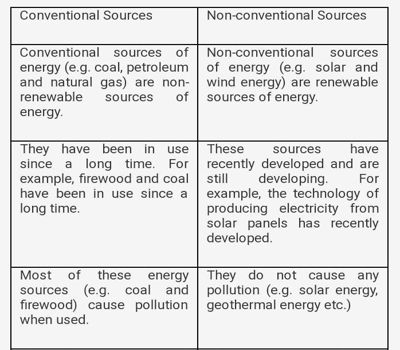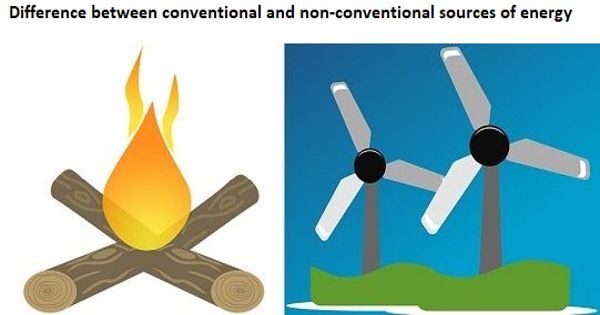Energy is one of the major parts of the economic infrastructure, being the basic input needed to sustain economic growth. Energy implies the capacity or ability to work vigorously. Energy resources are broadly classified as Conventional and Non-conventional sources of energy. Conventional sources of energy are the natural energy resources that are present in a limited quantity and are being used for a long time. Conventional sources of energy are not present in the environment in abundance, however, their uses are unlimited.
On the contrary, non-conventional energy sources are the sources present in the environment in large quantity but are used for limited purposes only. Non-conventional sources of energy are energy sources that are continuously replenished by natural processes. This article sheds light on the differences between conventional and non-conventional sources of energy. The energy obtained from non-conventional sources is known as non-conventional energy.
Conventional sources of energy, as the name suggests, are those sources which are widely used all around the world for ages. On the contrary, non-conventional sources of energy are described as energy sources whose evolution has been done in the recent past and has gained popularity since then.
Difference between Conventional and Non-conventional Sources of Energy

CONVENTIONAL SOURCES OF ENERGY
- Conventional sources of energy are the sources that are commonly in use for a long time.
- As the conventional sources of energy are limited in nature, and their formation takes millions of years, they can be exhausted one day.
- Conventional sources of energy are natural energy resources that are regularly used for many years and are accepted as fuel to produce heat, light, food, and electricity.
- The energy produced from conventional sources is highly used for industrial and commercial purposes.
- Conventional sources of energy are generally non-renewable sources of energy as the accumulation or creation of conventional sources of energy takes years, once they are exploited or consumed. As these sources are used on a large scale, the reserves have been depleted, and their alternative is hard to find.
- Conventional sources of energy are costly because they are scarce but their uses are unlimited.
NON-CONVENTIONAL SOURCES OF ENERGY
- Non-conventional sources of energy refer to the sources that are identified a few decades ago.
- Non-conventional sources of energy are the sources that are in abundance in the environment and are easily renewable, so they are inexhaustible.
- An alternative to conventional sources of energy is the non-conventional sources of energy, which achieved popularity in recent years, after the oil crisis in 1973 and since then they are in use on a large scale. The energy can be obtained from various sources such as the sun, wind, biological wastes, hot springs, tides, etc. to generate heat and power.
- The energy generated out of non-conventional sources is used for domestic purposes.
- These are not only renewable sources of energy but are also pollution-free. These sources are present in abundance in nature, and they are constantly generated, so it cannot be exhausted easily, and used again and again.
- Non-conventional sources of energy are less expensive, because of their enormous presence in nature.
Information Source:
















